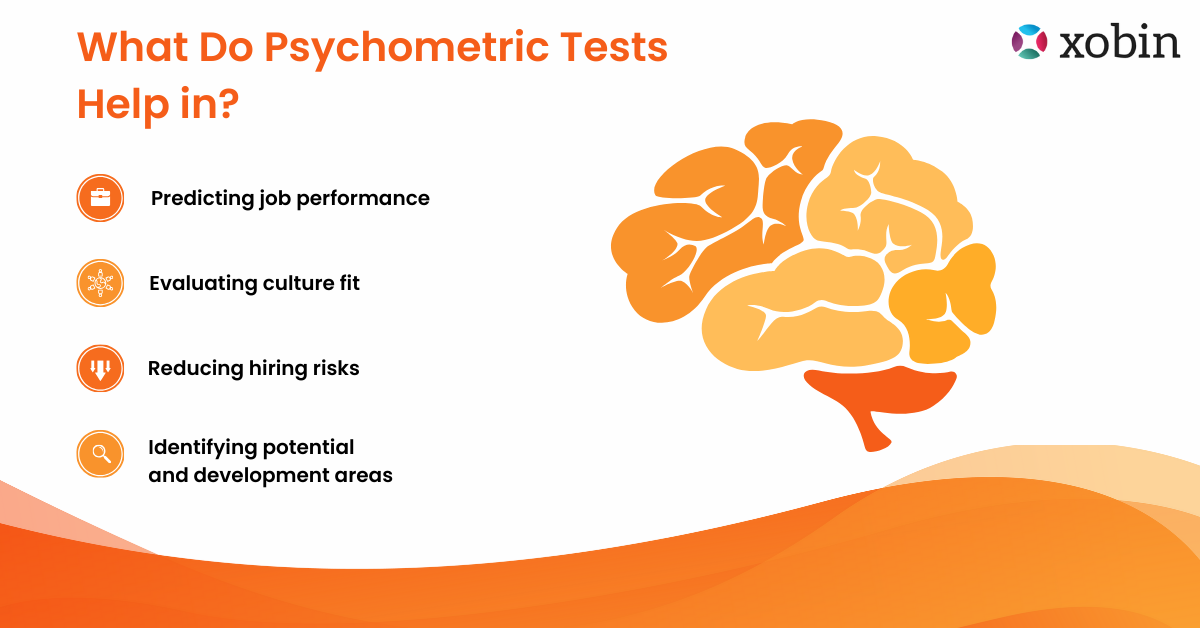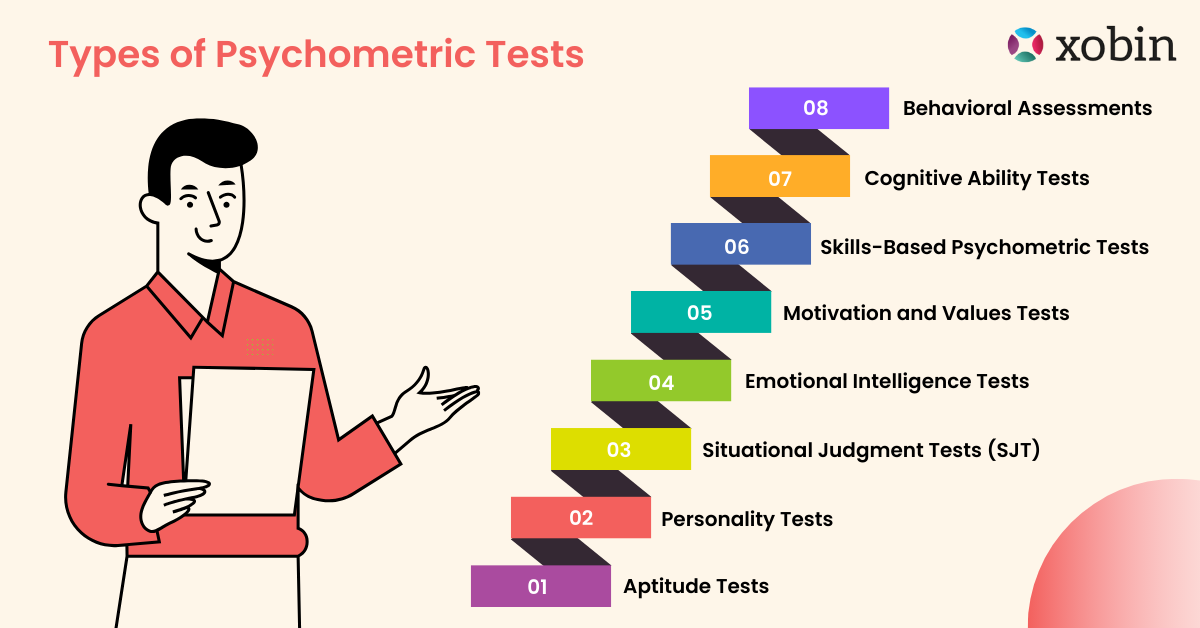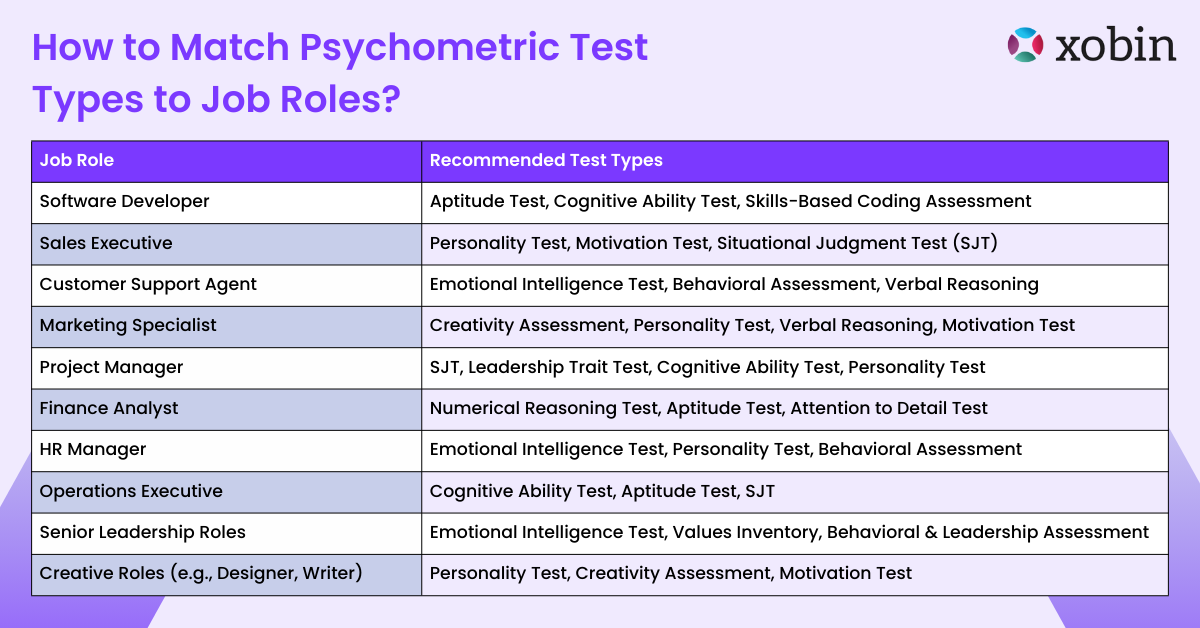Hiring the right candidate isn’t just about resumes and interviews anymore. To truly understand someone’s potential, you need to look deeper into how candidates think, work, and fit into teams. That’s where psychometric evaluation comes in. These scientifically designed assessment tests help recruiters uncover hidden traits, cognitive abilities, and personality dynamics. In this blog, we’ll break down the types of psychometric test used in recruitment and guide you on when to use them for smarter hiring decisions. No fluff, just actionable insights!
Table of Contents
TL;DR – Key Takeaway!
- Psychometric tests help recruiters evaluate candidates beyond resumes by measuring cognitive abilities, personality traits, and emotional intelligence, improving hiring accuracy.
- Different types of psychometric test in recruitment serve different purposes: aptitude tests for problem-solving, personality tests for cultural fit, and situational judgment tests for decision-making.
- Aptitude, personality, emotional intelligence, and behavioral psychometric tests are best matched to specific roles for maximum accuracy.
- Using the right test at the right time boosts hiring efficiency and reduces turnover by matching candidates’ strengths to job roles precisely.
- Combining multiple tests, such as cognitive and emotional intelligence assessments, creates a comprehensive profile that predicts job success more reliably.
- Layered assessments reduce bad hires and time-to-fill by up to 50%, especially when used at the pre-screening stage for high-volume roles.
- Using Xobin’s psychometric testing software, recruiters gain instant access to validated tests, auto-graded reports, and secure remote proctoring making hiring faster and fairer.
What Are Psychometric Tests?
Psychometric tests are standardized tests used to measure individuals’ mental abilities, behavioral traits, emotional intelligence, and skill proficiency. They go beyond interviews to give recruiters quantifiable data about a candidate’s suitability for a role.

These tests give clear insights into how someone thinks, solves problems, and interacts with others. As a result, employers can make better hiring decisions.
Moreover, psychometric tests help in identifying the right role for a candidate based on their strengths. They also support employee development by showing areas for improvement. In short, psychometric tests help in building stronger teams and improving workplace performance.
The best part? When applied correctly, these tests lead to faster, fairer, and smarter hiring decisions.
Types of Psychometric Test
Recruiters need to be strategic. Not every job role needs every test. Below, we break down the most commonly used types of psychometric test and explain when each one delivers the most value.

1. Aptitude Tests
Aptitude tests are designed to measure a candidate’s logical reasoning, analytical thinking, and problem-solving capabilities. They offer a standardized way to assess cognitive abilities that directly correlate with job performance.
Types of aptitude tests include:
- Numerical Reasoning Tests: Evaluate a candidate’s comfort with numbers, graphs, and data interpretation. Ideal for roles in finance, data analysis, and engineering.
- Verbal Reasoning Tests: Measure comprehension, grammar, and logical deductions from text. Suitable for content, communication, and administrative roles.
- Logical Reasoning Tests: Test abstract thinking, patterns, and sequences. Often used in technical and analytical roles.
When to use it?
Use aptitude tests early in the hiring process to filter candidates for analytical or problem-solving roles. They help identify high-potential talent quickly and objectively.

2. Personality Tests
Personality tests dig into behavioral traits, interpersonal style, and emotional tendencies. Rather than measuring ability, they reveal how someone is likely to behave in a workplace environment.
Popular models include:
- Big Five Personality Traits: Measures openness, conscientiousness, extraversion, agreeableness, and emotional stability.
- DISC Profiles: Focuses on dominance, influence, steadiness, and compliance.
- MBTI (Myers-Briggs Type Indicator): Categorizes people into 16 personality types based on how they perceive the world and make decisions.
When to use it?
Use personality tests when hiring for roles that require strong collaboration, communication, or leadership. They’re especially helpful in assessing cultural fit and reducing long-term attrition.
3. Situational Judgment Tests (SJT)
Situational Judgment Tests use hypothetical, job-related scenarios and ask candidates to choose how they would respond. These tests actively evaluate real-world decision-making through practical thinking. As a result, they help employers understand how candidates might handle challenges in the workplace.
Skills measured:
- Conflict resolution
- Ethical decision-making
- Time management
- Leadership response
When to use it?
Great for roles that demand customer interaction, leadership, or ethical judgment. Also useful for assessing how well a candidate will handle high-pressure environments.

4. Emotional Intelligence Tests
Emotional Intelligence tests gauge how well a candidate understands and manages emotions both their own and those of others. These skills are strongly linked to empathy, communication, and leadership success.
Common EI elements include:
- Empathy and self-regulation
- Social awareness
- Stress tolerance
- Conflict resolution
When to use it?
Ideal for customer-facing roles, team leaders, or anyone in charge of people. It’s especially useful in industries like hospitality, healthcare, and sales.
5. Motivation and Values Tests
These assessments explore what drives a candidate, whether it’s money, recognition, autonomy, or purpose. They help ensure alignment between the individual and your company’s mission.
Assessed traits include:
- Achievement orientation
- Work ethic
- Innovation drive
- Risk tolerance
When to use it?
Use these when hiring for roles that require long-term commitment, passion, or alignment with mission-driven cultures, such as startups, nonprofits, or high-growth companies.
6. Cognitive Ability Tests
Cognitive Ability Test evaluates how quickly someone can learn new information, apply logic, and respond to unfamiliar challenges. Unlike general aptitude, cognitive ability tests go beyond knowledge to assess potential.
Skills evaluated include:
- Memory
- Focus and attention
- Visual-spatial awareness
- Processing speed
When to use it?
Critical for fast-paced roles in tech, product management, data analytics, or startup ecosystems where adaptability and speed are essential.
7. Skills-Based Psychometric Tests
Unlike generic aptitude tests, skills-based psychometric tests evaluate domain-specific competencies such as coding, writing, or technical knowledge. These tests are often practical and role-focused.
When to use it?
Must-have for hiring developers, designers, writers, marketers, and technical specialists.
8. Behavioral Assessments
Behavioral tests often use structured questionnaires to evaluate a candidate’s tendencies in various professional settings. They are often tied to competency frameworks or success predictors in existing roles.
Examples include:
- Conflict resolution styles
- Leadership traits
- Risk tolerance
- Adaptability
When to use it?
For senior-level hiring, succession planning, and team development. It also supports onboarding and post-hire coaching.
How to Match Psychometric Test Types to Job Roles?
Choosing the right type of psychometric test isn’t just about testing for the sake of it, it’s about aligning each test to the role’s demands and success factors. Here’s a quick-reference table to help you pair test types with specific job roles:

In practice, recruiters often combine multiple test types. For instance, a graduate program might start with a general aptitude test, then follow with a personality inventory or SJT relevant to the role. According to psychometric experts, use the test types that match job needs.
For Example, emotional-intelligence test for a sales position, analytical and problem-solving test for a technical role. By strategically choosing assessments, hiring teams gain a clearer, multi-dimensional view of each candidate.

Use the Right Test, Make the Right Hire!
Psychometric testing isn’t one-size-fits-all. Every role demands a unique combination of skills, mindset, and behavior. Whether you’re hiring at scale or evaluating niche talent, our software helps you screen smarter and hire faster. By understanding the different types of psychometric test and knowing when to use each, recruiters can make more confident, data-driven hiring decisions.
- Scientifically Validated Assessments: Evaluate over 100+ personality traits, including aptitude, personality, and emotional intelligence.
- Ready-to-Use Test Library: Access customizable pre-build 3400+ skill-based tests and 2500+ job role-based test
- Custom Test Builder: Create role-specific assessments aligned with your organization’s hiring needs.
- Auto-Graded Reports: Instantly generated, easy-to-understand reports for faster decision-making.
- AI based Proctoring: Ensure integrity with advanced AI driven proctoring features for secure testing environment.
Thousands of companies trust Xobin to simplify hiring and make smarter decisions. Whether you’re recruiting for high-volume roles or niche technical positions, Xobin provides everything you need to hire with confidence.
Ready to upgrade your hiring process with powerful psychometric assessments? Book a personalized demo today and discover how easy and effective data-driven hiring can be.






